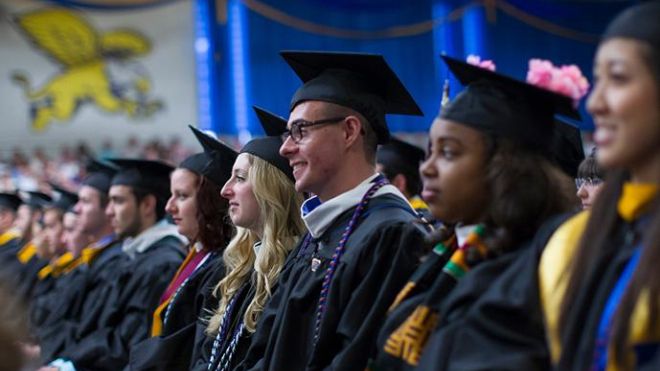BUFFALO, NEW YORK – The Canisius University Communication Studies Department recently unveiled a $250,000 high-definition (HD) upgrade to its television studio and media center, located on the fourth floor of Lyons Hall. The upgrade is the latest of several improvements to support the college’s communication studies, journalism and digital media arts programs.
“Whether students choose to study video, design, animation, journalism or interactive media, they can do so in facilities and on equipment, which are state-of-the-art,” says Barbara J. Irwin, PhD, chair of the Communication Studies Department. “Moreover, this HD upgrade provides a cutting-edge technological impression on prospective students and their families who tour our facilities.”
From cameras to the control room, the college’s television studio and media center now operate as complete HD production and post-production facilities. Students have a new arsenal of HD field cameras (Canon XHA1S HD) and SLR (Single-lens Reflex) cameras, available for checkout. The college’s television studio is equipped with Panasonic AG-HPX300 video cameras. A new high-speed video network enables students to capture footage directly to a 32 TB server, and edit the footage immediately in newly upgraded editing suites equipped with MAC Pro Final Cut. A robotic camera, capable of being mounted on either a studio crane or track, “enables students, in such courses as digital filmmaking, to achieve exquisite shots,” says Jamie O’Neil, associate professor and director of digital media arts at Canisius University.
In addition, the installation of a NewTek TriCaster 850 switcher and chroma key green screen makes the Communication Studies Department among the first, locally, to utilize virtual set technology. This technology serves a dual purpose for students.
The TriCaster enables communication studies and journalism students to achieve the same sophisticated television studio look as broadcast networks, which operate the same technology. With lights, a simple camera set-up and a green screen, on-camera talent can seamlessly be integrated into virtually any environment: from behind a news or sports desk to inside a classroom or in front of a city skyline.
Digital media arts students use the TriCaster technology to learn digital compositing techniques. This is where actors’ movements on a green screen are fed back to a computer. They are then placed into animated, three-dimensional virtual worlds, similar to what is portrayed in the 3-D epic filmAvatar.
“The way Canisius approached this upgrade was to focus on cross-functionality, which is the key to students finding work once they graduate,” says O’Neil. He explains that “Canisius students shoot narrative films, provocative social documentaries and use HD equipment in unforeseen ways with mobile devices. We integrate virtual sets into the journalism major, and converge animation and game design courses with the work of our college filmmakers.”
In addition to enhancing the academic experience, the HD upgrade supports such co-curricular initiatives as the Canisius University Video Institute. Comprised of communication studies, journalism and digital media arts students, the Video Institute provides students with opportunities to put their classroom lessons to work on projects that enrich their learning and benefit the greater community. Students produce social documentaries and service-oriented videos – all connected by the theme of social justice – to promote discourse on ethical, social and cultural issues relevant to the world today.
The communication studies, journalism and digital media arts programs at Canisius are among the college’s most successful. The department has a 30-year tradition of graduating leaders in the field of television broadcasting including, among others, Jodi Johnston ’95, MS ’99, television news anchor at WGRZ-TV, Channel 2; Mary Lynn Ryan ’84, southeast regional bureau chief at CNN; and Steve Brown ’83, FOX News. Numerous other professional broadcasters teach part-time in the department.
Canisius University is one of 28 Catholic, Jesuit colleges in the nation and the premier private college in Western New York. Canisius prepares leaders – intelligent, caring, faithful individuals – able to pursue and promote excellence in their professions, their communities and their service to humanity.
TV Studio Gets HD Upgrade
November 22, 2011



